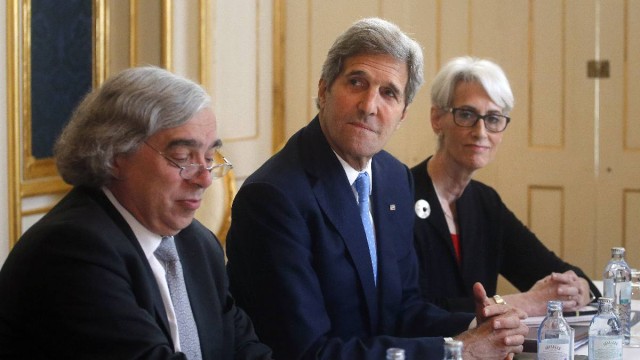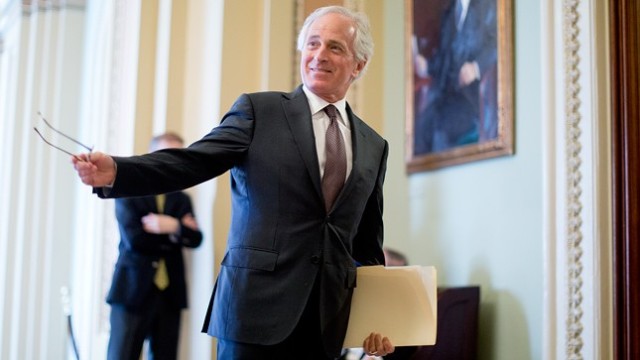UN IAEA: Iran Violated Nuclear Deal Before it is Even Inked
Amidst frenetic Administration efforts to spin a possible Iran deal comes evidence that it has already been violated given an IAEA Report and analysis by Washington, DC –nuclear watchdog, the Institute for Science and International Security. Adam Kredo in today’s Washington Free Beacon reported these last minute developments, “Iran Violates Past Nuclear Promises on Eve of Deal”:
The International Atomic Energy Agency (IAEA) disclosed yesterday that Iran has failed to meet its commitments under the interim Joint Plan of Action to convert recently enriched uranium gas to powder.
While Iran has reduced the amount of enriched uranium gas in its stockpiles, it has failed to dispose of these materials in a way that satisfies the requirements of the nuclear accord struck with the United States and other powers in 2013.
Wednesday’s disclosure by the IAEA sent the State Department rushing to downplay the Iranian violation.
Obama administration officials insisted that despite Iran’s failure to meet its obligations, negotiations were still on track and that Tehran would face no repercussions.
One U.S. official who spoke with the Associated Press on Wednesday said that instead of converting its uranium gas into uranium dioxide powder as required, Iran had transformed it into another substance. The IAEA found that Iran had converted just 9 percent of the relevant stockpile into uranium dioxide.
The official went on to downplay concerns about Iran’s violation, claiming that Tehran was only having some “technical problems.”
The “technical problems by Iran had slowed the process but the United States was satisfied that Iran had met its commitments,” the AP reported the official as saying.
“Violations by Iran would complicate the Obama administration’s battle to persuade congressional opponents and other skeptics,” the AP continued.
David Albright, a nuclear expert and founder of the Institute for Science and International Security (ISIS), warned that the United States is weakening its requirements on Tehran as a final deal gets closer.
“The choosing of a weaker condition that must be met is not a good precedent for interpreting more important provisions in a final deal,” Albright wrote in an analysis published late Wednesday.
While Iran was not in compliance with the oxidation requirement, the IAEA found that it did get rid of uranium gas that surpassed a self-imposed benchmark of 7,650 kg.
The IAEA’s disclosures are in contrast to comments made by Kerry last summer when he assured observers that Iran would live up to the interim agreement.
“Iran has committed to take further nuclear-related steps in the next four months” and “these include a continued cap on the amount of 5 percent enriched uranium hexafluoride and a commitment to convert any material over that amount into oxide,” Kerry said.
The Israel Project (TIP), which has sent officials to Vienna to track the deal, wrote in an email to reporters that the administration looked like it was “playing Tehran’s lawyer” in a bid to defuse potential fallout from the IAEA’s report.
This is not the first time that Iran has been caught by the IAEA cheating on past nuclear arrangements.
As negotiations between the sides slip past their June 30 deadline and stretch into July, Iranian officials have become more insistent that the United States consent to demands on a range of sticking points.
President Hassan Rouhani also threatened to fully restart Iran’s nuclear program if negotiators fail to live up to any final agreement.
One Western source present in Vienna said the administration is scrambling to ensure that nothing interferes with a final deal.
“Once again, the White House will go to any length needed to preserve the Obama-Iran deal, even if it means covering up Iran’s failure to convert all of the nuclear material as promised,” said the source.
“If they had admitted Iran failed to live up to the letter of the JPOA—as is the case—this one-week extension period of the JPOA would be totally invalidated and the talks would be over,” the source added. “Like they have for months, the administration continues to hide violations and is acting more like Iran’s advocate than the honest broker the American people deserve. “
Will these IAEA/ISIS revelations upend the P5+1 Iran deliberations in Vienna? We bet the Obama State Department and White House spokespersons will continue the charade of “don’t believe your lying eyes”. All while Iran ‘s Supreme Ruler stiff arms the talks in Vienna with new ‘red lines” trusting that greed by the P5+1 over billions of trade and development deals will lift $150 billion in sanctions relief upon inking a deal. Both Israel and the US Congress are increasing wary of this deal that will provide a nuclear breakthrough by Iran. If achieved the deal will vault Iran’s state sponsorship of terrorism. Iran could develop one bomb to wipe Israel off the map of the world and an ICBM to detonate an EMP over the US fulfilling their Mahdist apocalyptic dream and both Israel’s and our nightmares.
EDITORS NOTE: This column originally appeared in the New English Review. The featured image is of U.S. Energy Secertary Moniz, Secretary of State Kerry and Undersecretary Wendy Sherman taken in Vienna, July 1, 2015. Source: Reuters.


